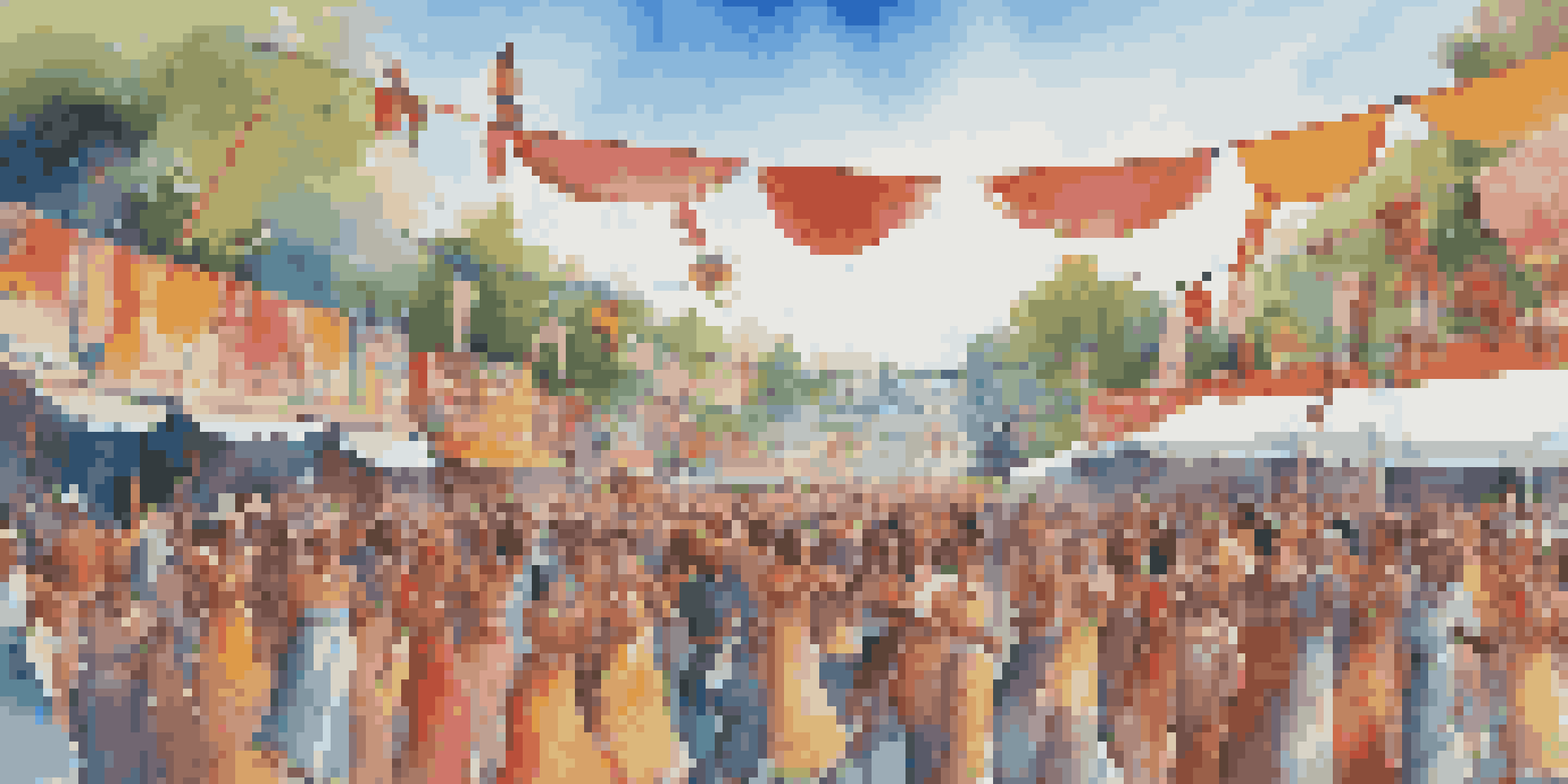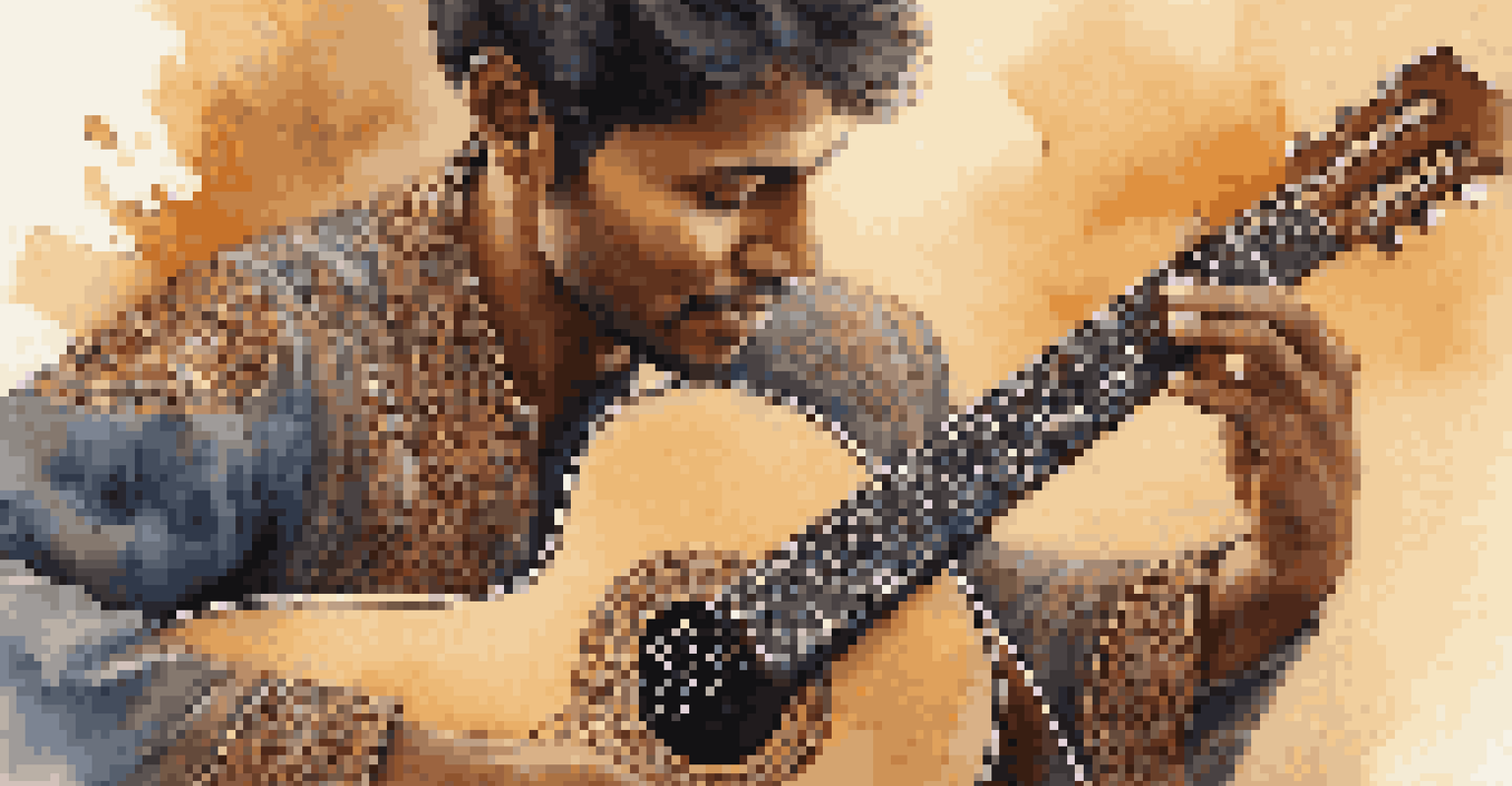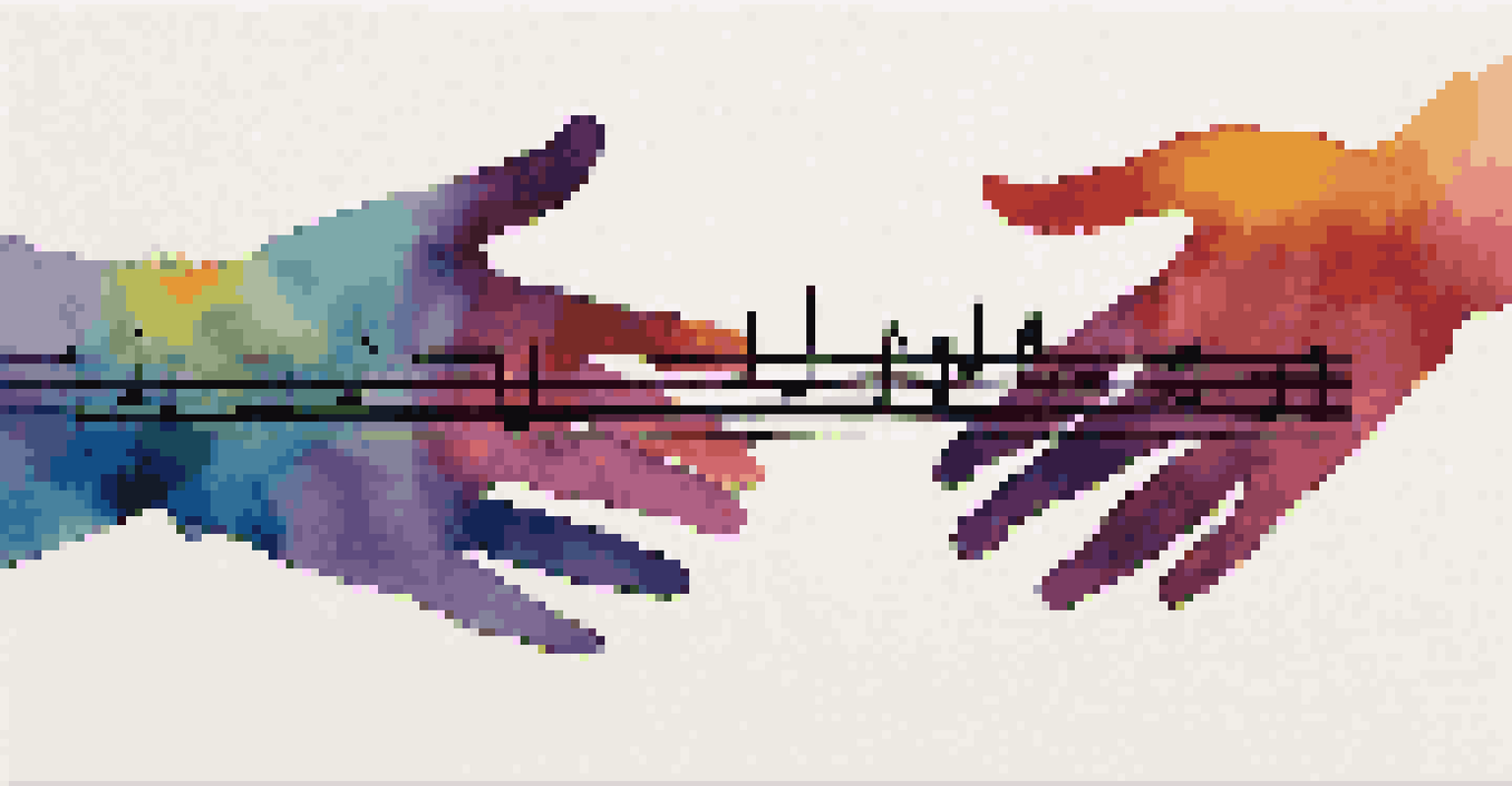How Music Provides a Voice for Underrepresented Communities

The Historical Role of Music in Social Movements
Throughout history, music has served as a powerful tool for social change, often echoing the struggles and aspirations of marginalized communities. For instance, during the Civil Rights Movement, songs like 'We Shall Overcome' became anthems of hope and resilience. These melodies not only united people but also provided a platform to express their pain and dreams for a better future.
Music is the shorthand of emotion.
Similarly, music genres such as reggae and hip-hop emerged as responses to systemic oppression, giving voice to the experiences of those who felt unheard. Through lyrics that convey raw emotion and real-life stories, artists can highlight social injustices, galvanizing their listeners into action. This historical context demonstrates music's ability to foster solidarity and inspire change among underrepresented groups.
Today, we continue to see how music fuels social movements worldwide, from protest songs in the streets to powerful ballads that address inequality. The evolution of musical expression underscores its timeless relevance as a voice for the voiceless, reminding us that every note carries the potential to spark conversations and drive progress.
Music as a Reflection of Cultural Identity
Music is a mirror that reflects the rich tapestry of cultural identity, often serving as a medium for communities to share their unique stories. For many underrepresented groups, traditional music forms—like folk or indigenous songs—embody their heritage and collective history. These genres not only preserve cultural legacies but also empower individuals to reclaim and celebrate their roots.

When artists create music that incorporates their cultural influences, they open doors for listeners to experience different perspectives and understand diverse narratives. This cultural exchange is essential in a globalized world, fostering empathy and respect among various communities. For example, K-pop has gained international acclaim, showcasing South Korean culture and allowing fans worldwide to connect with its vibrant artistry.
Music Fuels Social Change
Throughout history, music has united marginalized communities and inspired movements for social justice.
Moreover, the fusion of different musical styles can give rise to new genres that further amplify underrepresented voices. By blending cultural elements, artists create a unique sound that resonates with wider audiences, ultimately enriching the global music scene and challenging stereotypes about marginalized communities.
The Impact of Lyrics on Social Awareness
Lyrics are often the heart of a song, conveying messages that resonate deeply with listeners. For underrepresented communities, powerful lyrics can address issues such as inequality, discrimination, and social justice, serving as a call to action. Artists like Kendrick Lamar and Janelle Monáe have made significant impacts by crafting lyrics that provoke thought and spark dialogue about pressing societal issues.
Without music, life would be a mistake.
Through storytelling, these artists shed light on their personal experiences, making complex topics more relatable and accessible. When listeners engage with these narratives, they gain insights into the struggles faced by marginalized communities, fostering greater understanding and compassion. This emotional connection can motivate individuals to become advocates for change in their own communities.
Moreover, sharing these lyrics across platforms—be it social media or live performances—can amplify their reach and impact. As more people resonate with these messages, they can inspire collective action, illustrating how music can be a catalyst for social change and awareness.
Platforms that Elevate Underrepresented Artists
In today’s digital age, various platforms have emerged that prioritize showcasing underrepresented artists and their music. Streaming services like Spotify and Apple Music have curated playlists specifically designed to highlight diverse voices, allowing these artists to reach broader audiences. This increased visibility can be transformative, giving artists the opportunity to share their stories and connect with fans worldwide.
Social media platforms, particularly TikTok and Instagram, have become vital tools for artists to promote their music and foster community engagement. Many creators use these platforms to share their creative processes, making it easier for fans to connect with them on a personal level. This interaction often leads to a loyal fan base that champions the artist's work and message.
Cultural Identity Through Music
Music reflects cultural heritage, allowing underrepresented groups to share their stories and connect with a global audience.
Furthermore, initiatives like Music Forward Foundation and organizations that support women in music play a critical role in elevating underrepresented voices. By providing resources, mentorship, and platforms for these artists, they help cultivate a more inclusive music industry that celebrates diversity and amplifies the voices of those who have historically been overlooked.
Collaboration Across Genres and Communities
Collaboration has become a powerful way for artists from different backgrounds to unite and amplify each other's voices. When musicians from underrepresented communities collaborate with established artists, it creates opportunities for cultural exchange and mutual support. For example, the collaboration between artists like Shakira and Wyclef Jean not only blended musical styles but also showcased diverse cultural influences to a global audience.
Such partnerships can break down barriers and challenge stereotypes, allowing listeners to appreciate the richness of different musical traditions. By creating art together, these artists can share their unique experiences while reaching audiences that may not have been exposed to their individual styles. This shared creativity enhances the music landscape, promoting inclusivity and understanding.
Moreover, collaborative efforts often result in songs that resonate with a wider audience, driving home the message of unity and diversity. As more artists embrace collaboration, we witness the emergence of a more interconnected music scene that celebrates the voices of all communities.
Music Festivals: A Celebration of Diversity
Music festivals have evolved into vibrant spaces that celebrate diversity and amplify underrepresented voices. Events like Coachella and Glastonbury are increasingly prioritizing diverse lineups, showcasing artists from different backgrounds and genres. These festivals provide a platform for marginalized artists to gain exposure while also offering audiences a chance to experience a variety of cultural expressions.
Attending these festivals allows fans to immerse themselves in different cultures, fostering a sense of community among attendees. The atmosphere becomes a melting pot of ideas and experiences, where music serves as a common language that transcends borders. This celebration of diversity not only enriches the festival experience but also encourages dialogue about the importance of representation in the music industry.
Collaboration for Diversity
Collaborative efforts among artists from different backgrounds enhance inclusivity and promote a richer music landscape.
Furthermore, many festivals are now incorporating panels and discussions focusing on the challenges faced by underrepresented artists, highlighting their contributions to the music scene. This combination of entertainment and education creates a more inclusive environment, reminding attendees of the power of music in bringing people together and amplifying diverse voices.
The Future of Music and Underrepresented Voices
As we look to the future, the role of music in providing a voice for underrepresented communities seems more vital than ever. With advancements in technology and the rise of independent music production, artists have more opportunities to share their stories without relying solely on traditional record labels. This democratization of music offers a chance for diverse voices to emerge and thrive in the industry.
Moreover, as social movements gain momentum, music continues to play a crucial role in rallying support and inspiring change. Whether through protest songs or empowering anthems, artists are finding innovative ways to connect their messages with audiences, driving home the importance of inclusivity and representation. For example, the resurgence of genres like folk-punk emphasizes grassroots activism and community engagement.

Ultimately, the future of music is a space where underrepresented voices will not only be heard but celebrated. As audiences become more aware of the importance of diversity in music, we can anticipate a richer, more vibrant landscape that honors the myriad experiences and stories that shape our world.